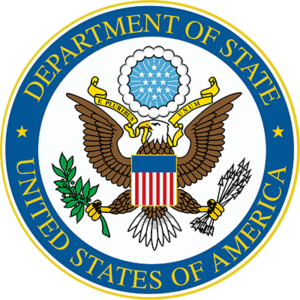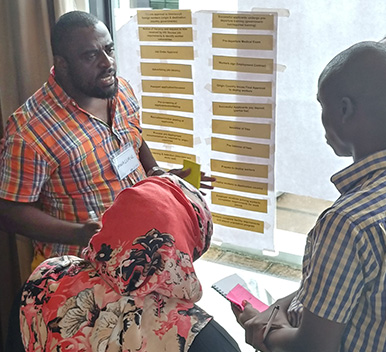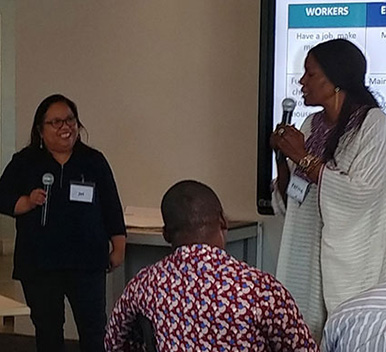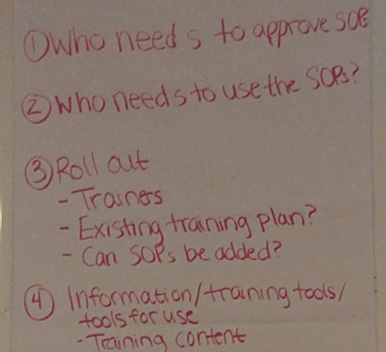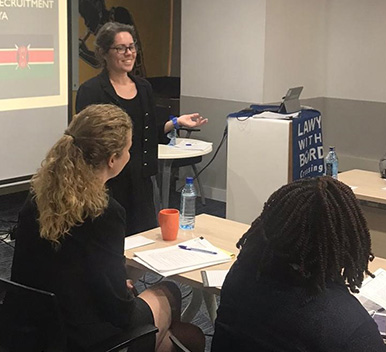Project Overview
-
Focus on building ethical recruitment capacities where worker risks are highest – the lowest tiers of the labor supply chain:
-
Build incentives through training labor agents on the business case for ethical recruitment
-
Build deterrents through strengthening government capacities to investigate and prosecute unlawful cross-border labor recruitment
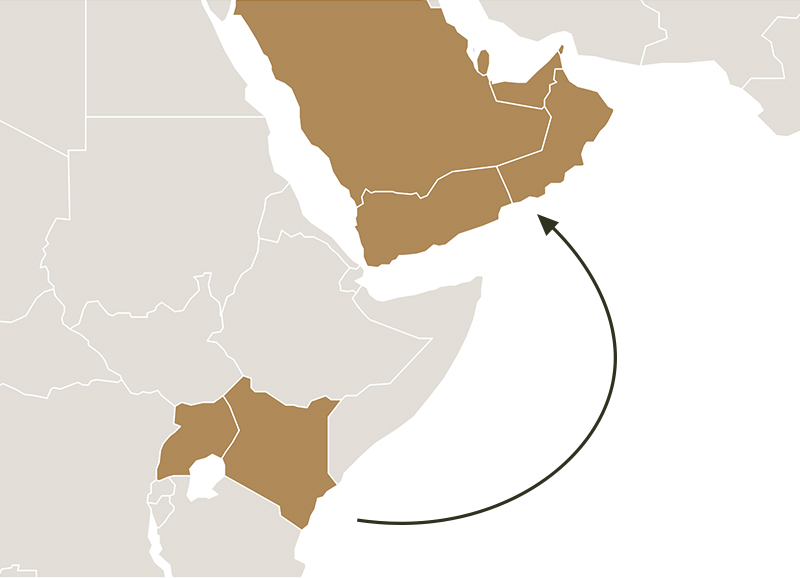
Verité’s project, which began in 2016, focuses on reducing risks of human trafficking and forced labor for low-wage migrants from Kenya working in Gulf Cooperation Council (GCC) countries, including Qatar and the UAE. The project is designed to build ethical recruitment capacity at the lower tiers of the labor supply chain.
Project accomplishments:
-
Trainings of Kenyan labor agencies to encourage ethical recruitment management practices
-
Adoption of a Code of Ethical Conduct by Kenyan recruitment agencies by members of the two national professional associations
-
Establishment of a set of Standard Operating Procedures for the Investigation and Prosecution of Illegal Labor Recruitment and Trafficking in collaboration with the Government of Kenya
-
Development of SAFE TIPS Guide to encourage civil society, workers’ organizations, and government institutions to disseminate Pre-Employment Guidance to Kenyan workers facing foreign employment recruitment
-
Creation of guidance tool for Gulf employers to increase demand for ethical recruitment and improve due diligence and monitoring of the lowest tiers of the company’s labor supply chain
This project is funded by the United States Department of State Bureau of Democracy, Human Rights, and Labor (DRL), and is implemented by Verité in partnership with the Council of Anglican Provinces of Africa Counter Trafficking Team, Equidem Research and Consulting, IOM Kenya, and Lawyers Without Borders.
For more information contact the Project Director, Sarah Lince, at slince@verite.org.
Our Approach
Focus on Recruitment Area of Highest Risk to Workers and Employers
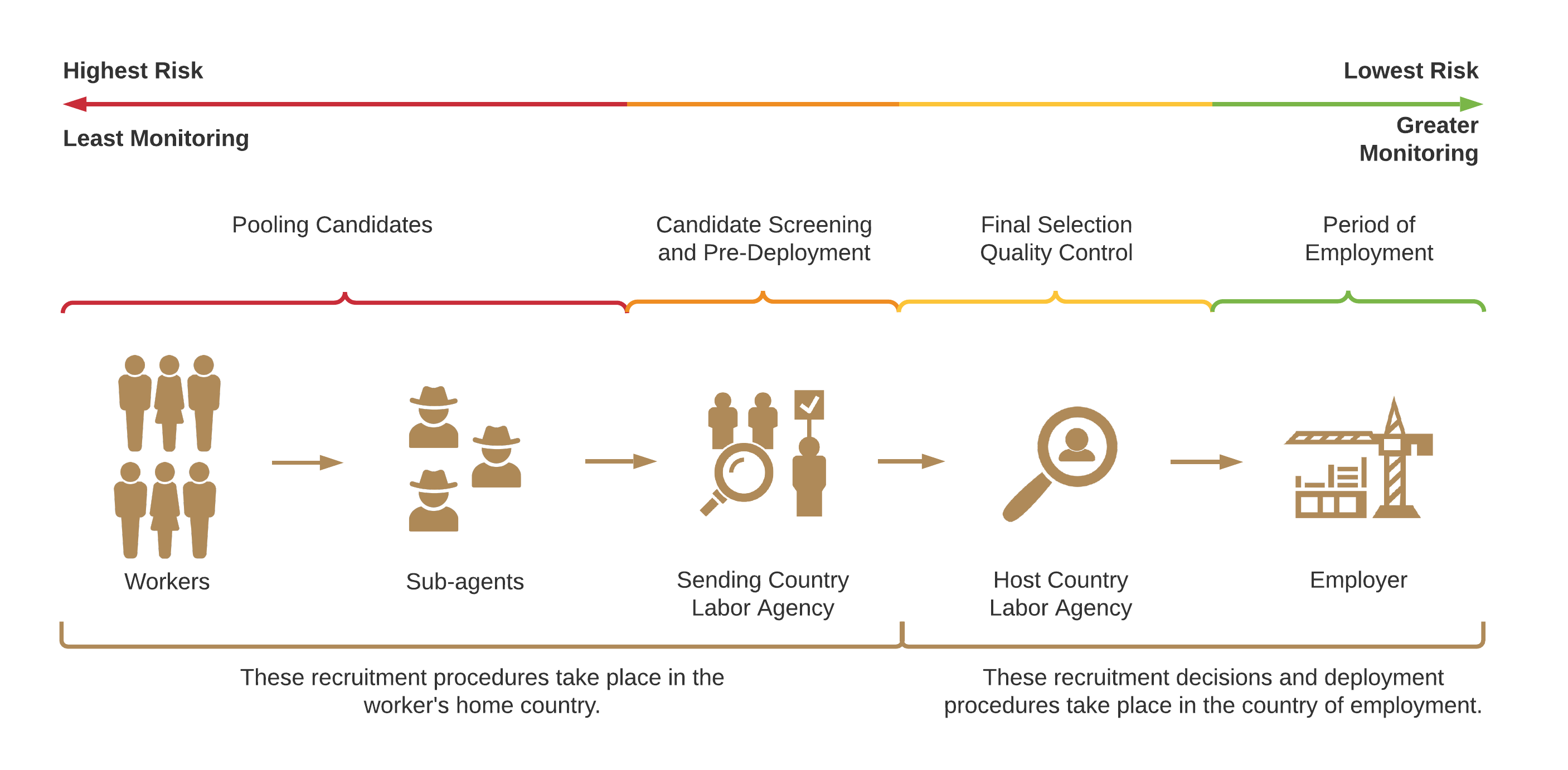
Improving the willingness and capability of employers and recruitment agencies to effectively implement ethical recruitment remains the most effective way to reduce the vulnerability of migrant workers to exploitation during recruitment.
However, what also matters is when workers receive information that can improve worker awareness about risks faced during labor migration. Traditionally, such interventions have focused on Pre-Departure Trainings (PDTs), which typically occur after a worker has been selected by a foreign employer, and just prior to transit to the foreign job. At this stage it is too late – the worker has already traversed the riskiest steps of the recruitment process, such as payment of fees to a labor agency contributing to risk of debt bondage, and/or agreeing to a foreign job after receiving false or deceptive information about the terms and conditions, which contributes to risk of unfree consent to the work. Debt bondage and unfree or coerced consent are key indicators of forced labor.
Providing workers with Pre-Employment Guidance at the earliest stages of recruitment to a foreign job can improve workers’ capacities to build resiliency and make informed decisions during recruitment to reduce vulnerability to forced labor and other exploitation.
Capacity Building Focal Points
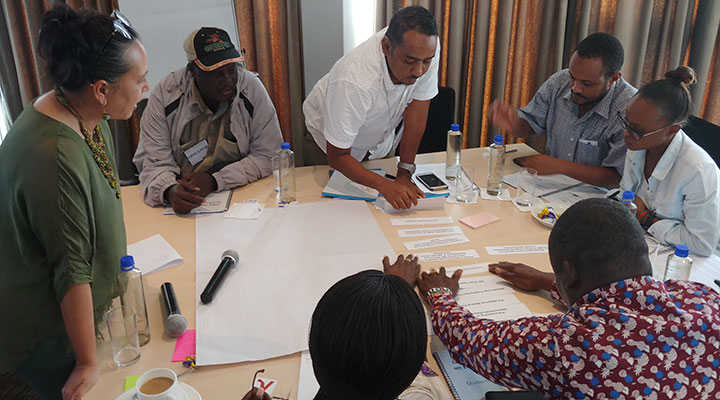
Building Incentives:
Employers and private employment agencies (PEAs) are two key stakeholders who wield significant influence in the labor market. As a result of this power, their actions have significant potential to drive ethical recruitment of Kenyan workers for foreign employment. However, to become leaders in this change, employers and private employment agencies need tools and strategies to adopt ethical recruitment business management and due diligence practices.
Key project outcomes:
-
Emphasized incentives by training leading Kenyan private employment agencies on the business case for adopting responsible recruitment practices to protect migrant workers
-
Encouraged Gulf employers to demand ethical recruitment through greater due diligence and monitoring of the labor supply chain’s lower tiers, including through development and dissemination of guidance tools and materials
-
Established a Code of Ethical Conduct aligned with the ILO Fair Recruitment Principles, adopted by members of the two Kenyan national labor agency professional associations
-
Developed tools for the Government of Kenya, tailored to the labor market context, to continue trainings and promotion of ethical recruitment amongst labor agencies
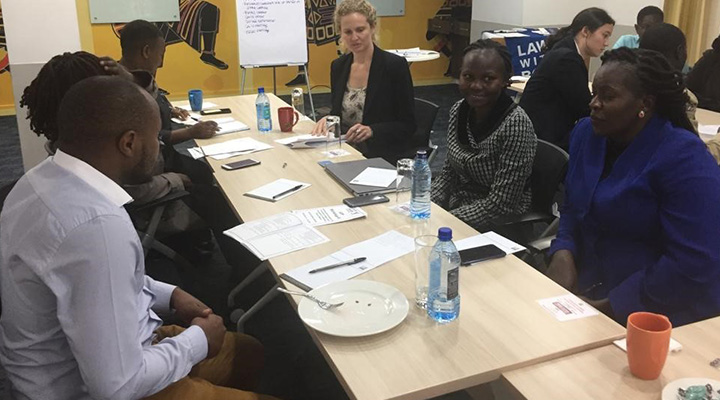
Building Deterrents:
The Government of Kenya is the primary regulator of the Kenyan overseas labor recruitment industry. However, lack of clear procedures and guidance for investigators and prosecutors pose a challenge to enforcing such regulations as well as Kenya’s counter-trafficking laws. To effectively regulate the recruitment industry, the Government of Kenya must have improved capacity to enforce laws to combat forced labor and trafficking for labor exploitation.
Key project outcomes:
-
In partnership with Lawyers Without Borders, undertook an extensive and cross-ministerial, two-year process with the Government of Kenya to develop a set of Standard Operating Procedures for the Investigation and Prosecution of Unlawful Labor Recruitment and Trafficking for the Purposes of Labor Exploitation (known as the CTIP SOP)
-
Built consensus across governmental bodies such as the Ministry of Labor, Ministry of Foreign Affairs, Department of Public Prosecutions, Counter Trafficking in Persons (CTIP) Secretariat, Kenyan National Human Rights Commission, and key civil society stakeholders to establish CTIP SOP
-
The CTIP SOP is expected to be launched in Kenya in June 2021.
Project Highlights
Code of Ethical Conduct Established for Kenyan Labor Agencies
Verité, in consultation with the two leading labor agency professional associations in Kenya, established a Code of Ethical Conduct in alignment with ILO Fair Recruitment Principles. KAPEA (the Kenyan Association of Private Employment Agencies), and ASMAK (the Association of Skilled Migrant Agencies of Kenya) represent a membership of more than half of the licensed labor agencies in Kenya. The associations now require their members to commit to the principles outlined in the Code of Ethical Conduct. Principles established in the code include compliance with the law, conveying full and truthful information about job opportunities to candidates pooled or screened by the agency, and keeping detailed records of recruitment procedures to better serve clients and mitigate recruitment irregularities.
Ethical Recruitment Appreciation Courses for Labor Agencies in Mombasa & Nairobi
In 2018, 2019 and 2020, Verité and The Fair Hiring Initiative invited Kenyan labor agencies to participate in a series of Ethical Recruitment Appreciation Courses in Mombasa and Nairobi. Leading private employment agencies participated in the two-day workshop which engaged participants in understanding international ethical recruitment standards as well as the business case for ethical recruitment in the Kenya-Gulf corridors. A highlight of the trainings included conference calls with Staff House Resources International, a leading Philippines recruitment agency recently awarded for its progress on compliance with ethical recruitment principles in Philippines-Gulf and other corridors. The trainings also included a participant mapping of the recruitment process for several Kenya-Gulf corridors, noting where and how fees and costs arise in the process in order to identify points at which the sending country agent can leverage business relationships to promote responsible recruitment.
Training Government Officials in Kenya
Verité, in partnership with IOM Kenya, held a workshop in 2018 for Government of Kenya members of the National Migration Coordination Mechanism (NMCM). The training focused on capacity-building around identifying forced labor and trafficking risks faced by Kenyan workers during the recruitment process, particularly those recruitment steps occurring in Kenya. The workshop also discussed the role of policy and enforcement in promoting incentives and deterrents to ethical recruitment.
This training included a key “icebreaker” conversation to mend relations between NMCM members and leading labor agencies in Kenya. The discussion identified a common goal held by the Government of Kenya and labor agencies: the elimination of unlawful and unlicensed labor recruitment in Kenya, which (from the government’s perspective) would reduce risks for Kenyan workers, and (from the labor agencies’ perspective) would eliminate unfair competition for agencies pursuing lawful and ethical recruitment.
This project was made possible through the generous support of the United States Department of State Bureau of Democracy Human Rights and Labor. The opinions expressed herein are those of the author(s) and do not necessarily reflect the views of the United States Department of State.
